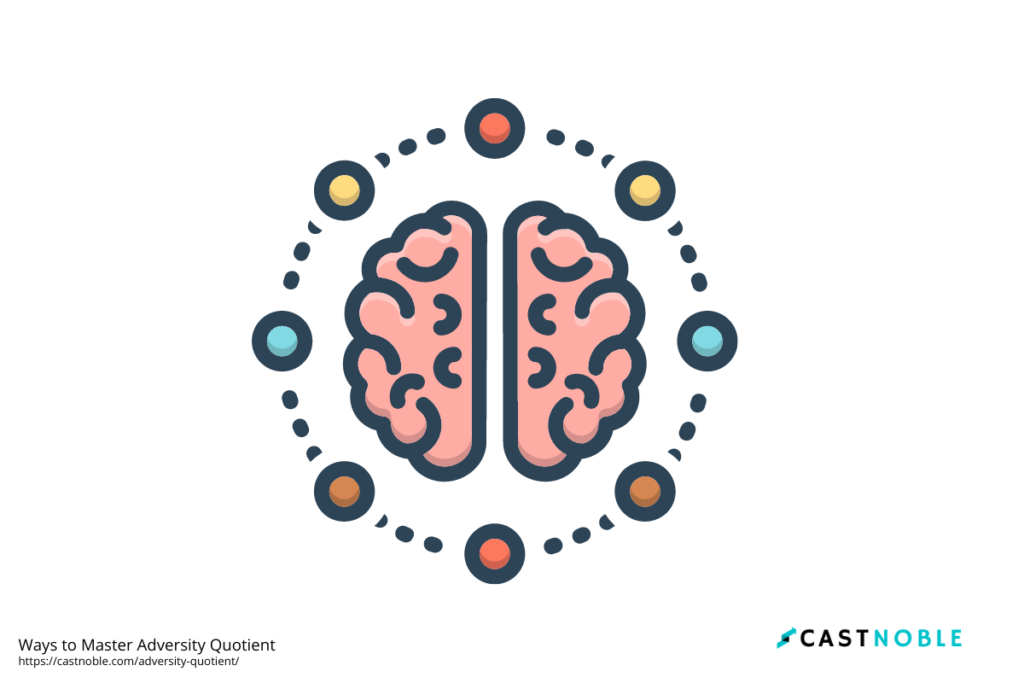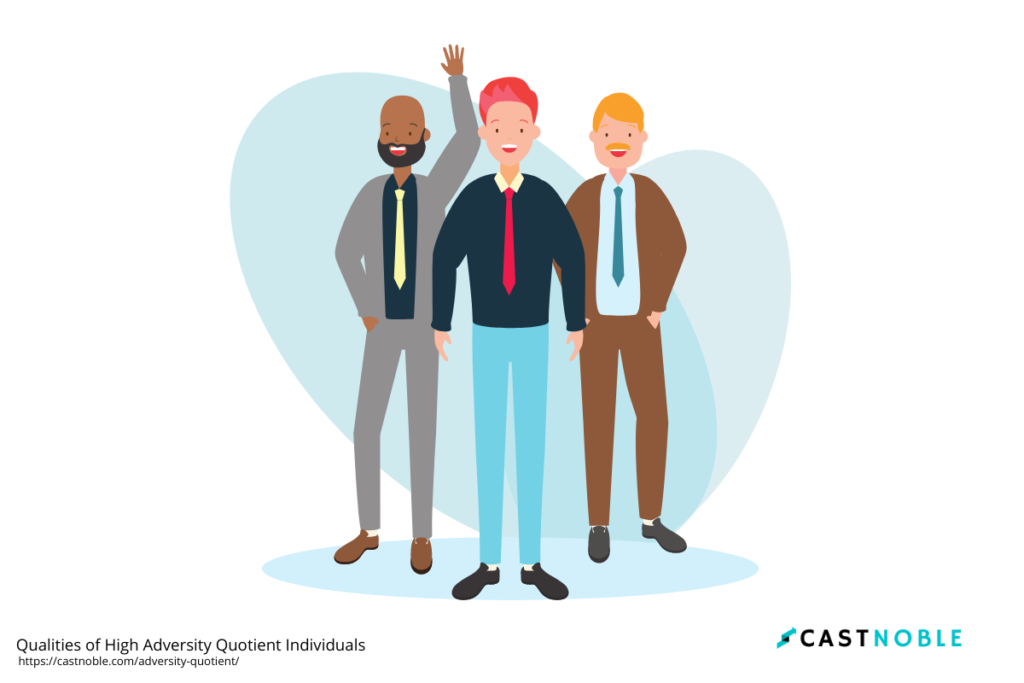
Resilience during setbacks.
How do you handle every difficulty you face in life? Can you endure every misfortune life gives you?
As we walk through life, we encounter events that help us grow to maturity, and these milestones are measured– it is called the development quotient.
Most of us are familiar with emotional quotient (EQ) and intelligence quotient (IQ). Intelligence quotient (IQ) is the measured cognitive ability of an individual, and as we grow, we become aware of our emotions.
That’s when emotional quotient (EQ) takes place. It measures the person’s ability to handle their feelings.
Both development quotients are essential for a person, but these two are not sufficient to ensure mental stability when facing a problem.
When we grow older, our setbacks in life have become problematic throughout the years. It is vital to overcome misfortunes with resilience.
The measurement of a person’s ability to handle adversities well is the adversity quotient (AQ).
If a person has these three development quotients (EQ, IQ, and AQ), they can quickly adapt and learn from the misfortunes.
He or she creates a solution for the problem (IQ) and handles emotions well (EQ). While you are planning and controlling your emotions well, you are measured by how you fully respond to them (AQ).
Are you intrigued by the new development quotient? If yes, let’s continue to discuss this exciting concept of adversity quotient.
What is Adversity Quotient (AQ)?

In the industry, people who have excellent adversity quotient are the most-sought. They have the trait that they can quickly adapt and overcome setbacks with ease.
Adversity quotient (AQ) is sometimes called the science of resilience.
In 1997, Paul Stoltz developed an assessment method, the Adversity Response Profile (ARP). Adversity quotient (AQ) is how a person responds to their daily situations in life.
As you become more resilient with life’s adversities, the more constructive and effective your response is to live’s struggles– which becomes more fulfilling as we go through life.
CASTNOBLE
Why is Adversity Quotient Important?

Adversity quotient is the foundation of human endeavor and a more powerful coping mechanism than intelligent quotient. How can you survive with intelligence if you can’t handle daily struggles?
As a leader
Leaders do not only have an excellent intelligence quotient (IQ) and emotional quotient (EQ); they have a high adversity quotient (AQ).
Their IQ helps them make rational decisions and process situations quickly, while their EQ keeps them level-headed no matter how stressful the problem.
Meanwhile, AQ plays a critical role in the success and power of an organization. They can quickly get back up after a failure, which is the most valuable asset of a leader.
As a person
Adversities come in different faces– it could be in your personal life, career, business, or community. An individual with low AQ will easily experience anxiety, depression, or other mental health and physical health issues.
If you are easily fazed by the adversity and unpleasant challenges, you need to change your response. Handle the situation and take responsibility.
It is normal to experience failure. Failure is an opportunity to grow.
If you have reached the point of despair while overcoming a setback, reassess your response or mindset, get up, and start over. Practice self-awareness. It is one of the pillars of mastering adversity and resilience.
Self-awareness allows you to understand your triggers, responses, and how to manage them.
No one can avoid adversities forever, but you can strike back and live a fulfilling life.
CASTNOBLE
As a business owner
People who plan an entrepreneurial journey realize they will face dire struggles as they start and grow their business.
However, business owners with high AQ overcome every adversity that goes their way.
They keep their passion burning, learn from the misfortunes, and move forward.
They do not overthink. Overthinking leads to negative results. Instead, they maintain a positive attitude and embrace the challenges.
When business owners struggle, they learn from it. They are not easily swayed when their solution does not work. Instead, they keep on looking for resources that can help them innovate their products and services.
Business owners are not afraid to ask for help. It is in their nature to look for more expert resources. They do not isolate themselves when they face adversity.
As a business owner, resilience is accepting and making adversity a norm. They aim for long-term success for their business.
Thus, they solidify their entrepreneurial strengths, and they do not avoid any risk or competition– they are brave enough to give it a shot.
In your relationships
As a parent, friend, or family member, it is in our best interest to encourage resiliency and improve their adversity quotient.
Teach your relationships on how to bounce back and recover from adversities.
The best way to help them develop resiliency is to encourage them to experience situations. Allow them to experience failure and victory– it keeps them motivated to do better.
When you are resilient, it does not mean you do not have emotions– you do! You have to build strong emotional connections with your relationships.
Allow your loved ones to open up serious conversations once in a while. You will realize that letting them speak and connect with you gives them an idea that you are always listening to them.
Do not avoid constructive criticism. Although everyone wants to be recognized and appreciated, you have to give constructive feedback to learn.
Let them know and become aware of their shortcomings and help them improve them.
Understanding adversity quotient or resilience is a must to survive whatever challenge life throws at us. You can easily handle heavy responsibilities.
Through the simple acts, we do as a person, business owner, leader, or within our relationships, it helps strengthen your adversity quotient.
Bounce back and recover after a setback.
CASTNOBLE
Adversity quotient or resilience is not a made-up concept. There is a science behind it, the same with intelligence quotient (IQ) and emotional quotient (EQ).
The Science Behind Adversity Quotient or Resilience

If you think adversity quotient or resilience is all made up, there is a science behind it. A person’s neurophysiology and cognitive psychology have a direct relationship.
It is related to how you respond to difficulties and how it affects your mental and physical health.
The interaction between your psychological and mental processes to your nervous and immune system is called psychoneuroimmunology.
The relationship between low AQ and health is valid.
If you can’t handle or respond well to life’s hardships, it will affect your mental and physical health. Meanwhile, knowing how to handle adversities well will save you from being dragged down by challenging situations.
The human brain develops habits we are unconscious of. Start changing your habit and improve your response to adversity.
A healthy adversity quotient is essential for health, fulfillment, and longevity. People who do not know how to control, acknowledge, and embrace change are unhappy and spread negativity– they usually lead a shorter life.
Ways to Master Adversity Quotient

As you can improve your intelligence quotient, there are ways to master the adversity quotient. Mastering the adversity quotient helps you strengthen your capacity, morale, performance, innovation, and productivity.
How do you respond with adversities?
According to Todd Mayfield, all of us have constant yet subconscious patterns in responding to adversities, and some of these responses are unhealthy. If you cannot assess and meditate on your response patterns, it will remain with you and drag you down.
You have to assess yourself and receive constructive feedback from others; being self-aware is the first step in strengthening your adversity quotient.
In your life
As you master AQ, you take accountability for the adverse situation and develop a change or solution. There are four ways to improve AQ in life in general– through acknowledging it, owning it, solving the problem, and executing the solution.
- Acknowledging it: To make a change, you have to evaluate and determine what needs change. Aside from self-reflection, you have to be open about constructive feedback from people around you.
- Owning it: You have to accept the situation and the need to change to survive the adversities. Do not lose hope when you encounter failures and challenges. Instead, own it and adjust accordingly.
- Solving the problem: After acknowledging and owning up to the situation, you have to develop a plan or solution.
- Executing the solution: The last step is action. You have to make the change or solution to the problem.
If there’s one thing you have to do in life to master your adversity quotient is, it is to take accountability and embrace change.
At work
The success of a person at their workplace does not only require IQ and EQ. At work, you need to have a high AQ to appropriately respond to work’s frustrations, deal with different people, and get through unlucky days.
According to Paul Stoltz, there are four dimensions of adversity quotient at work– control, ownership, reach, and endurance.
- Control: You need to master control and influence under adverse circumstances. People with high AQ can interpret and think of a solution while under an overwhelming situation. Those who have low AQ give up easily.
- Ownership: You have to be accountable in dealing with situations, regardless of their cause, and be responsible for solving the problem. In contrast, those who have lower AQ turn their back and play the card of victimization.
- Reach: It is the act of setting failures into their place and not let them undermine their self-perception. People with low AQ tend to discourage themselves whenever they experience difficulties.
- Endurance: A person can see the bigger picture of each adversity. Even in the most challenging situation, they maintain hope and move forward.
In your business
Each entrepreneur has struggled and experienced adversity– irate customers, uneven cash flows, aggressive investors, and unpredictable economic downfalls.
High AQ entrepreneurs tackle business challenges one at a time without losing hope for their passion, and overcoming a dire situation gives them satisfaction. However, for those who have low AQ, adversities can drive them to despair.
Start with survival mode and follow this set of principles when facing adversity.
- Maintain positivity. Do not lose your passion. Learn from it. Sometimes the solutions that we have come up with are not the answer. Keep on looking for ways until it works. When doing so, keep your passion burning and maintain a positive attitude.
- No man is an island. Build relationships. Successful entrepreneurs reach out and ask for help from their advisors and peers. They accept constructive feedback and listen to their advice.
- Surround yourself with smart and motivated people. You have to be in control of the situation. Do not be afraid to solicit advice from experts.
- Accept adversity and refocus your strengths. Adversity is inevitable in every aspect of life. Instead of treating it as a crisis or end, accept it as a challenge that you will get through. Identify and refocus your strengths when handling challenging situations. Do not dodge competition or challenges, and it will not make your business grow.
You will always deal with risks and adversities in life. Remember, no entrepreneur succeeded by avoiding challenges. Entrepreneurs succeed because they handled it well.
In your community
Life is full of adversities, and it is a social happening too. As the saying goes, no man is an island. There should be a strong social connection in a community to cope better in dire situations.
You can build a community with a high adverse quotient through:
- Building support networks. The support and sense of community among the members will reduce social isolation. A person needs to be surrounded by people who understand them. Resiliency is not a “one-man” trait. A person with higher AQ needs a support network.
- Transparency and strong leadership. The leaders in the community should be transparent and deliver communication effectively and quickly. If the leader does not communicate with its members, they will feel lost, which will reduce community resilience.
- Share the same values and commitment to change. Community members should have the opportunity to discuss their concerns and contribute to the community. Their best interest, values, and commitment will give a sense of belongingness.
- Adequate resources. A community with sufficient facilities will help improve their social connection and increase their resilience.
Furthermore, a community should start building their social foundation from their children. Parents should engage with their children’s activities to form social networks and allow their children to be part of the community. It will help their children learn and develop a strong sense of resilience.
The mental toughness and emotional capacity of a high adversity quotient individual is always the driving force of their success.
Qualities of High Adversity Quotient Individuals

According to Paul Stoltz, the adversity quotient affects a person’s happiness and health. More so, it is a reliable factor in predicting a person’s success in life– it shows your subconscious pattern of responses.
You can tell if a person has a high AQ with these qualities:
Persistence.
A person with high AQ can persistently hang around in an environment with extreme circumstances. People who work in human relations have an idea of a person’s AQ.
You might wonder why human relations personnel ask about your previous job– how long have you stayed in your last workplace? What are the problems you have encountered? How did you handle the issues? What made you leave the company? The answers to these questions will help them determine your AQ.
Adaptability.
If you have a high AQ, you can quickly adapt to drastic changes in an environment. A change in the management, sudden cost-cut, or heavier workloads will not faze them. They accept challenges and embrace change readily. However, it does not mean they will sacrifice their physical and mental health for it– they know what’s possible to achieve and what’s taking a toll on the progress.
Control or influence.
A person with high AQ has a level of control or influence over the dire situation. Although not all adversities are controllable, these people believe that they can provide outcomes despite the extreme challenges.
High endurance.
They perceive every challenge and adversity as temporary. People with high AQ can endure the situation for an extended period because they know and hope that the problem will pass.
A person reacts differently in every setback, but whatever your initial response is, having an excellent adversity quotient will help you turn the dire situation into a productive one. Learn how to counter struggles constructively and readily.
Do not let your unhealthy subconscious patterns drain your energy.
References:
Relojo-Howell, D. (2020, December 16). The Role of Adversity Quotient in Dealing with Everyday Challenges. Retrieved January 17, 2021, from https://www.psychreg.org/adversity-quotient/
Stoltz, P. (2001). Adversity Quotient @ Work: Make Everyday Challenges the Key to Your Success. New York City, New York: Harper Paperbacks.
Leadership, P. (2016, July 26). 4 Steps to Develop Your AQ and Make Change Happen. Retrieved January 17, 2021, from https://www.inc.com/partners-in-leadership/4-steps-to-develop-your-aq-and-make-change-happen.html


